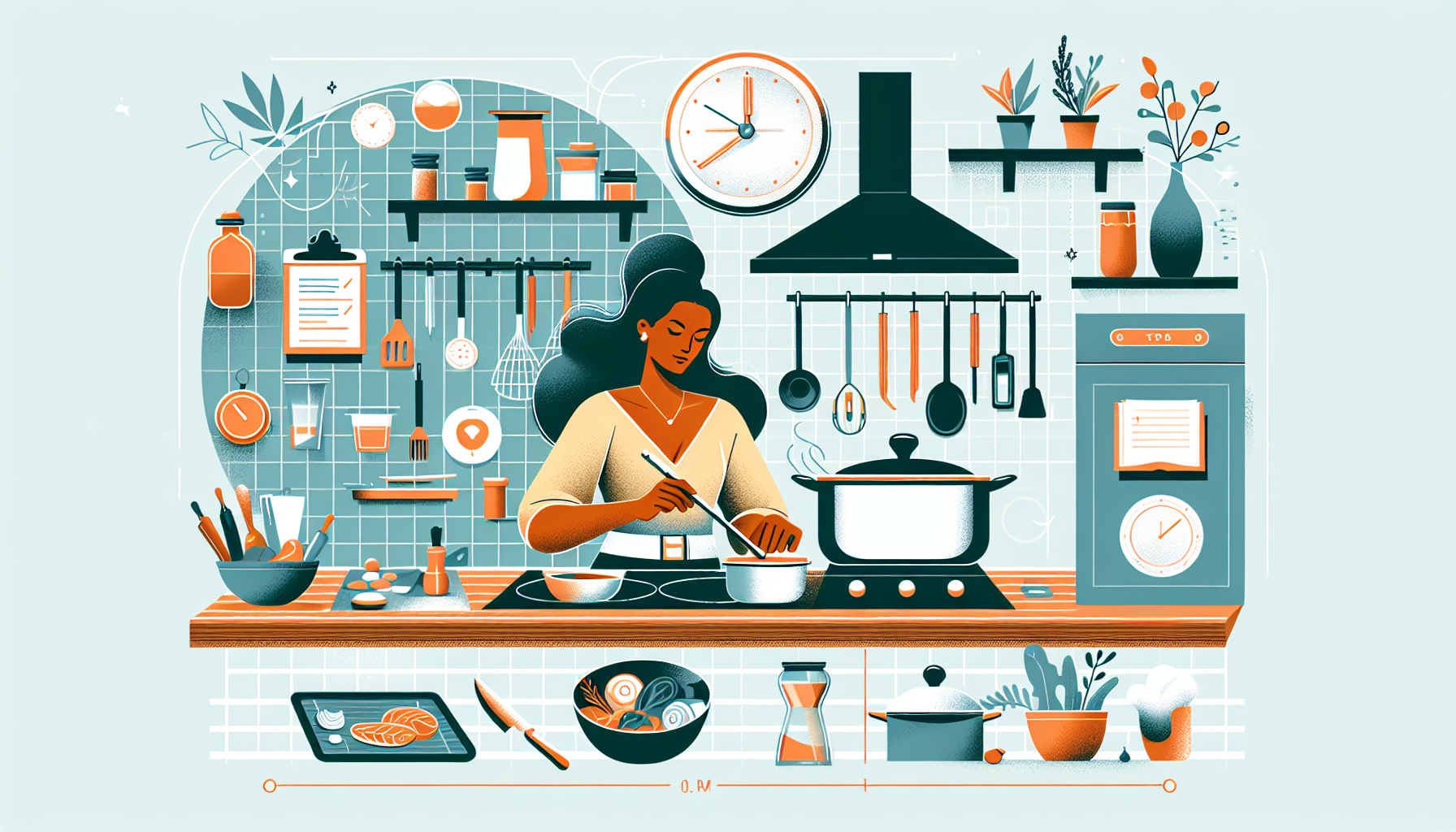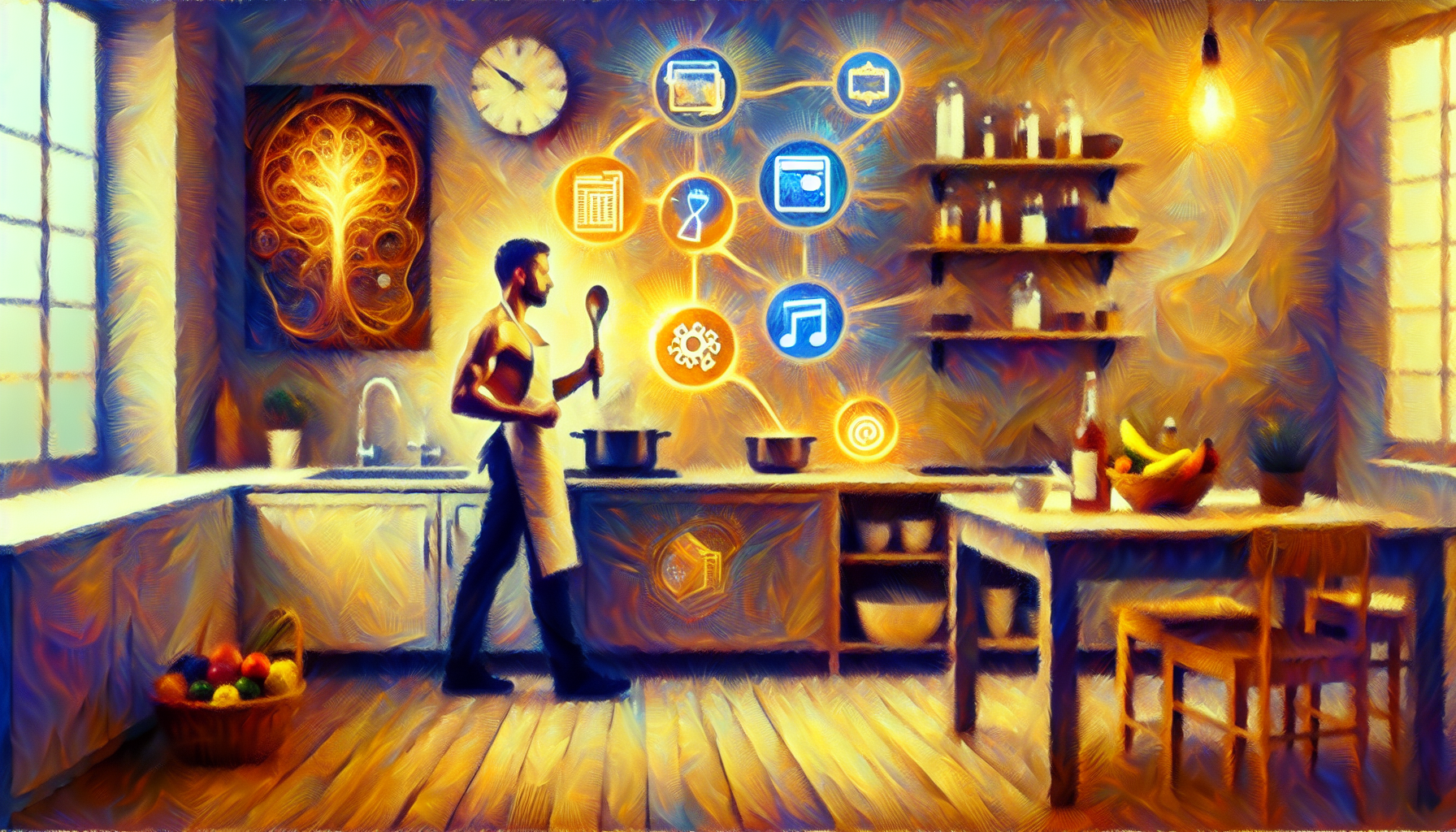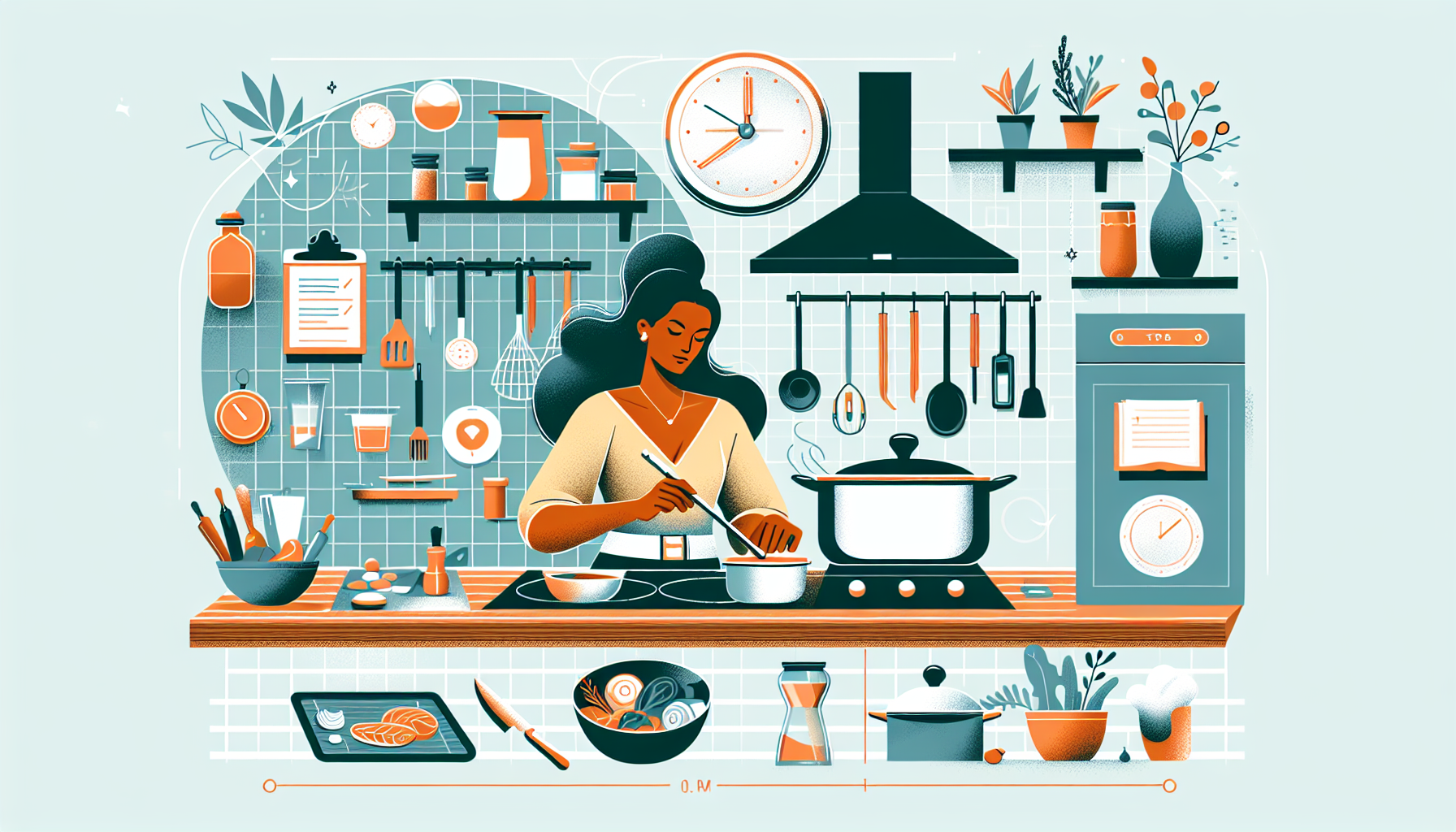Have you ever considered how solo cooking can impact your lifestyle and free time? Whether you’re a seasoned cook or just starting out, preparing meals for yourself can have significant benefits beyond satisfying your hunger. In this article, we will explore the ways in which solo cooking can positively influence your overall well-being, enhance your culinary skills, and provide you with valuable alone time to unwind and recharge. So grab your apron and get ready to discover the delightful world of solo cooking!

Improving Health
Choosing nutritious ingredients
When you cook for yourself, you have complete control over the ingredients you use. This allows you to make conscious choices and prioritize nutritious options. You can choose fresh vegetables, lean proteins, whole grains, and incorporate a variety of fruits into your meals. By selecting nutrient-dense ingredients, you can ensure that your body receives the essential vitamins, minerals, and antioxidants it needs for optimal health.
Controlling portion sizes
Portion control is crucial for maintaining a healthy weight and preventing overeating. When you cook at home, you have the advantage of portioning your meals according to your specific needs. By being mindful of portion sizes and listening to your body’s hunger and fullness cues, you can avoid mindless eating and practice moderation. This can be particularly helpful for those who struggle with portion control when dining out.
Reducing reliance on processed foods
One of the major benefits of solo cooking is the ability to reduce your reliance on processed foods. Processed foods often contain high levels of added sugars, unhealthy fats, and preservatives, which can negatively impact your health in the long run. When you cook for yourself, you can focus on using fresh, whole ingredients and minimize the consumption of processed foods. This shift towards homemade meals can lead to improved nutrition and overall health.
Saving Money
Eating out less frequently
Eating out can quickly drain your wallet, especially if done frequently. By cooking at home, you can save a substantial amount of money. Buying groceries and preparing meals yourself is generally cheaper than dining at restaurants or ordering takeout. Plus, the cost per serving is often significantly lower than what you would pay for a restaurant meal. By reducing your reliance on eating out, you’ll have more money to put towards other aspects of your life.
Making use of leftovers
Cooking for yourself allows you to plan your meals and make use of leftovers effectively. Instead of letting food go to waste, you can repurpose leftovers into new and delicious dishes. This not only saves you money but also prevents unnecessary food waste. Utilizing your creativity to transform leftover ingredients can lead to exciting meals and save you from having to buy additional groceries for every single meal.
Being mindful of the grocery budget
Solo cooking provides an opportunity to be mindful of your grocery budget. By planning your meals in advance and creating a shopping list, you can avoid impulse purchases and stay within your budget. Additionally, buying ingredients in bulk and taking advantage of sales can further stretch your dollar. This conscious approach to grocery shopping ensures that you are spending your money wisely and not overspending on unnecessary items.
Enhancing Creativity
Experimenting with new flavors
Cooking for yourself allows you to explore and experiment with a wide range of flavors. You have the freedom to be adventurous and try new ingredients, spices, and cooking techniques. This can broaden your palate, expand your culinary knowledge, and bring excitement to your meals. Whether you’re adding a pinch of exotic spices or incorporating unique combinations of ingredients, solo cooking encourages creativity and encourages you to step out of your culinary comfort zone.
Developing personalized recipes
As you gain experience in solo cooking, you have the opportunity to develop your own personalized recipes. You can modify existing recipes to suit your taste preferences, dietary needs, or cultural background. Creating your own recipes gives you a sense of ownership and allows you to tailor your meals exactly to your liking. It’s a chance to express your creativity and make dishes that truly represent who you are.
Presenting visually appealing dishes
Solo cooking offers a chance to present visually appealing dishes. When you’re cooking just for yourself, you may be inclined to take extra care in plating your meals. By arranging the food in an aesthetically pleasing manner, you can enhance the overall dining experience. This attention to detail can make your meals feel more special and elevate your appreciation for the food you prepare. Plus, it’s an opportunity to showcase your creativity and impress both yourself and others with beautifully presented dishes.
Promoting Self-Sufficiency
Gaining cooking skills
Solo cooking provides an excellent opportunity to develop and enhance your cooking skills. As you spend more time in the kitchen, you’ll become more comfortable with various techniques, such as chopping, sautéing, and baking. You’ll learn how to use different cooking utensils and equipment effectively. Over time, you’ll become more confident in your abilities and be able to handle more complex recipes. Acquiring these cooking skills not only makes you self-sufficient but also opens up a world of culinary possibilities.
Feeling accomplished
Cooking for yourself allows you to experience a sense of accomplishment and self-satisfaction. When you successfully prepare a delicious meal from scratch, you’ll feel a great sense of pride and fulfillment. It’s a tangible result of your efforts and shows that you are capable of taking care of yourself. This feeling of accomplishment can boost your self-esteem and motivate you to continue exploring your culinary talents.
Reducing reliance on pre-packaged meals
By cooking for yourself, you can reduce your reliance on pre-packaged meals and takeout options. These convenience foods often contain high amounts of sodium, unhealthy fats, and artificial additives. When you prepare your own meals, you have control over the ingredients, allowing you to create healthier alternatives. By reducing your consumption of pre-packaged meals, you can improve your overall nutrition and reduce your intake of preservatives and unnecessary additives.

Improving Time Management
Streamlining meal preparation
Solo cooking can help you streamline meal preparation and save time. By planning your meals in advance, you can efficiently batch cook and prepare ingredients ahead of time. This eliminates the stress of having to come up with meal ideas on the spot and speeds up the cooking process. Additionally, you can make use of time-saving kitchen gadgets and techniques, such as utilizing a slow cooker or pre-cutting vegetables. These time management strategies allow you to spend less time in the kitchen and more time on other activities.
Optimizing grocery shopping
When you cook for yourself, you become more conscious of your grocery shopping habits and can optimize the process. You can create a shopping list based on your planned meals, ensuring that you have all the necessary ingredients. This reduces the need for multiple trips to the grocery store and minimizes the chances of forgetting items. Additionally, organizing your shopping list according to the store layout can save you time navigating the aisles. By optimizing your grocery shopping routine, you can maximize efficiency and make the most of your free time.
Creating time-saving routines
Solo cooking allows you to establish time-saving routines that fit your lifestyle. You can designate specific days for meal planning, grocery shopping, and meal preparation. By dedicating a few hours each week to cooking in larger quantities, you can have ready-made meals or leftovers for the rest of the week. Developing these routines can help you create a more organized and efficient cooking process, allowing you to make the most of your time and free up valuable hours for other activities.
Reducing Stress
Finding solace in cooking
Cooking can be a therapeutic and stress-relieving activity. When you cook for yourself, you have the opportunity to find solace in the kitchen. As you chop, mix, and stir, you can focus on the task at hand and allow your mind to relax. The repetitive actions and the creation of something tangible can provide a sense of calm and tranquility. In times of stress, spending time in the kitchen can be a therapeutic escape that allows you to forget about your worries and focus on the present moment.
Alleviating anxiety
Solo cooking can alleviate anxiety by providing a sense of control and predictability. When you cook for yourself, you have full control over the ingredients, flavors, and cooking methods. This control can help reduce feelings of uncertainty and anxiety related to food choices. Additionally, the act of cooking itself can serve as a distraction and help shift your focus away from anxious thoughts. By engaging in the cooking process, you can promote relaxation and emotional well-being.
Creating a peaceful cooking environment
Cooking in a peaceful and calming environment can contribute to reducing stress. When you cook for yourself, you have the freedom to create a space that promotes relaxation. Play soothing music, light scented candles, or open a window to let in fresh air. Limit distractions, such as turning off the TV or putting away your phone. By setting the stage for a peaceful cooking experience, you can create a serene environment that allows you to fully enjoy the process and unwind.
Increasing Mindfulness
Focusing on the present moment
Solo cooking provides an opportunity to practice mindfulness and be fully present in the moment. When you cook for yourself, you can engage all your senses in the cooking process. Pay attention to the colors, textures, smells, and sounds of the ingredients as you prepare them. Take your time in observing the changes that occur during cooking. By focusing on the present moment, you can cultivate a sense of mindfulness and experience a greater appreciation for the act of cooking and the food you prepare.
Practicing patience
Cooking for yourself requires patience and the ability to wait for the food to be fully cooked. This can be a valuable exercise in practicing patience in other areas of your life. Waiting for a meal to simmer, bake, or roast teaches you to slow down and savor the process. It encourages you to be patient and trust that the end result will be worth the wait. By practicing patience in the kitchen, you can develop this valuable trait and apply it to various aspects of your life.
Recognizing the importance of self-care
Solo cooking allows you to prioritize self-care and nurture your own well-being. Taking the time to prepare a nutritious and delicious meal for yourself is an act of self-love. It shows that you value your health and happiness. By dedicating time and effort to cooking for yourself, you are sending a powerful message that you are deserving of nourishment and enjoyment. This recognition of the importance of self-care can have a profound impact on your overall lifestyle and well-being.
Building Confidence
Taking charge of one’s meals
When you cook for yourself, you are taking charge of your own meals and nourishment. This sense of control can significantly boost your confidence and empower you to make healthier choices. By actively participating in the cooking process, you can tailor your meals to meet your specific needs and preferences. This feeling of responsibility and independence can spill over into other areas of your life, as you realize that you are capable of taking charge and making positive changes.
Experimenting and problem-solving
Solo cooking encourages experimentation and problem-solving in the kitchen. As you explore different recipes and techniques, you’ll encounter challenges along the way. However, overcoming these obstacles can be incredibly satisfying and build your confidence. Whether it’s adjusting seasonings, rescuing a slightly burnt dish, or successfully incorporating a new ingredient, each solution boosts your confidence and strengthens your culinary skills. With each triumph, you’ll feel more emboldened to try new things and take risks in the kitchen.
Sharing culinary creations with others
Cooking for yourself provides an opportunity to showcase your culinary creations and share them with others. Whether it’s hosting a dinner party, bringing a dish to a potluck, or simply sharing a meal with friends or coworkers, you can proudly present your homemade dishes. Sharing your culinary creations not only allows you to receive appreciation and praise but also ignites a sense of satisfaction and accomplishment. It’s a wonderful way to build confidence and connect with others through the universal language of food.
Promoting a Balanced Diet
Including a variety of food groups
When cooking for yourself, you have the ability to ensure that your meals are well-balanced and include a variety of food groups. By incorporating fruits, vegetables, whole grains, lean proteins, and healthy fats into your dishes, you can meet your nutritional needs and promote a balanced diet. This variety provides your body with a wide range of essential nutrients and contributes to overall health and well-being.
Controlling added sugars and fats
Solo cooking allows you to have control over the amount of added sugars and unhealthy fats in your meals. Processed foods and restaurant meals often contain high levels of added sugars and unhealthy fats, which can negatively impact your health. By cooking for yourself, you can reduce or eliminate added sugars and unhealthy fats, making your meals healthier and more nutritious.
Meeting specific dietary needs
Solo cooking is particularly beneficial for individuals with specific dietary needs or restrictions. Whether you’re following a vegetarian, vegan, gluten-free, or allergen-free diet, cooking for yourself ensures that your meals comply with your specific dietary requirements. You have the freedom to choose ingredients that align with your needs and preferences, allowing you to nourish your body in a way that works best for you.
Creating Social Opportunities
Hosting dinner parties
Cooking for yourself provides a perfect opportunity to invite friends, family, or colleagues over for a dinner party. Hosting a dinner party allows you to showcase your culinary skills and share your passion for food with others. It creates a warm and inviting atmosphere where people can connect and enjoy good company along with delicious homemade meals. Sharing food and laughter around the dining table can create lasting memories and strengthen relationships.
Sharing homemade meals with friends and loved ones
Cooking for yourself offers a chance to share homemade meals with friends and loved ones, even outside of formal dinner parties. Whether it’s preparing a cozy meal for a loved one or baking treats to share at the office, sharing your culinary creations spreads joy and fosters connections. It allows you to express your love and appreciation for others through the language of food, deepening your relationships and creating opportunities for shared experiences.
Joining cooking communities
Cooking for yourself opens the door to joining cooking communities, both online and offline. Engaging with like-minded individuals who share your passion for cooking can be incredibly rewarding. Through these communities, you can exchange recipes, learn new techniques, and gain inspiration for your cooking endeavors. Joining cooking classes, attending workshops, or participating in online forums can provide a sense of belonging and create a social network of fellow food enthusiasts. By connecting with others who share your love for cooking, you can expand your culinary horizons and forge new friendships.
